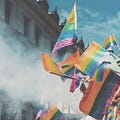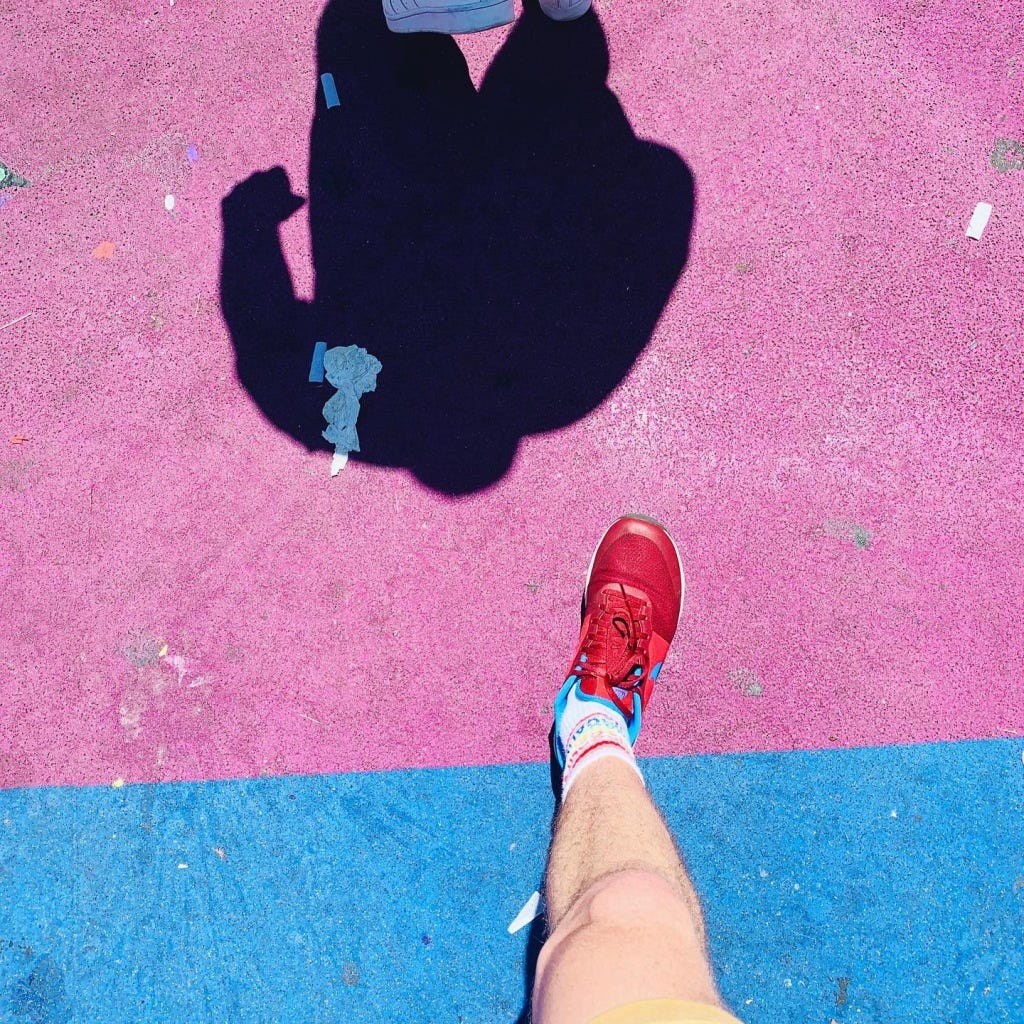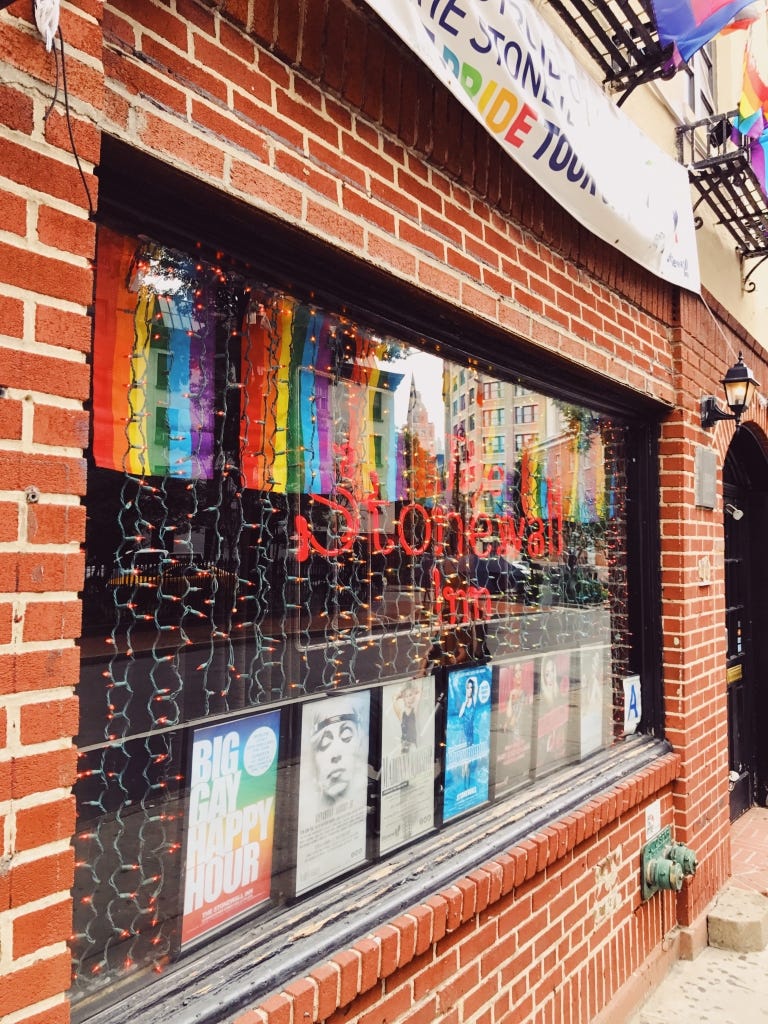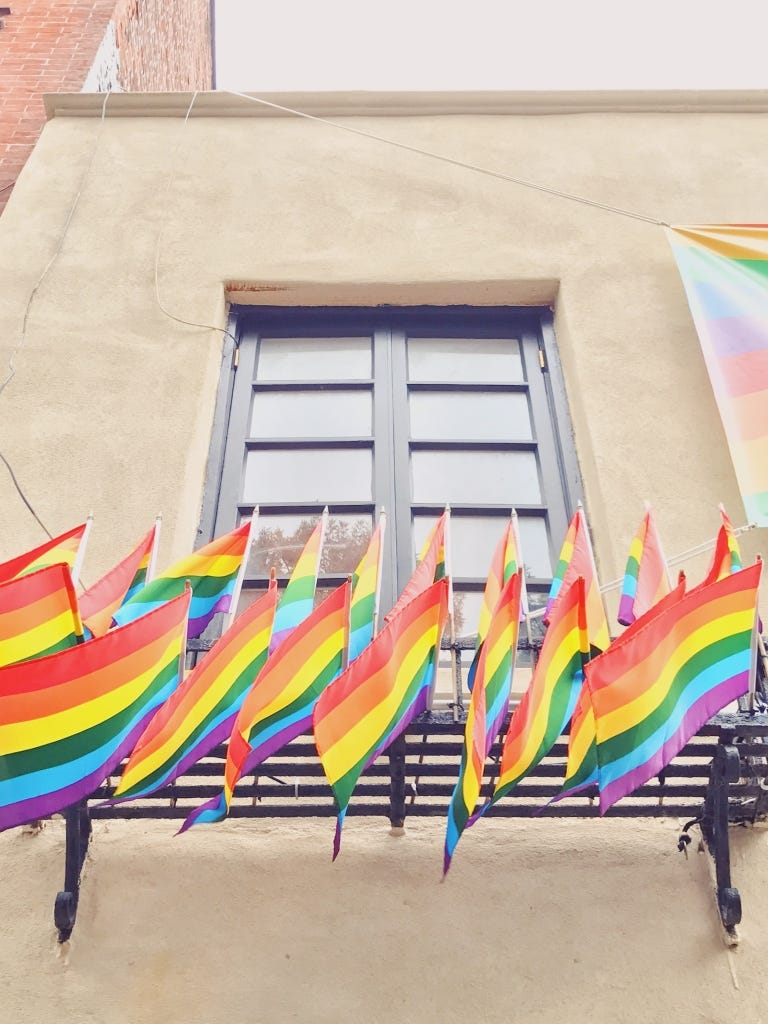It's June again, which means it's Pride Month for those who celebrate, myself included. So, with that in mind: Happy Pride, friends!
And, in the spirit of Pride Month, there's one other thing I need to say, just to get it out of the way: "It's a sin!" More specifically, pride is a sin, that is. You probably thought I was going to say, "being gay is a sin," didn't you? Not this time! Though, to be frank, I think the folks who are quick to speak up each June about how pride is a sin would probably also fall somewhere on the "being gay is a sin" spectrum. Alas, there's not much I can do about that today.
If you've been following my writing for any time at all, you already know that I always wrangle the nudist community into my pieces, and you may know that I tend to revel in any opportunity to find the intersecting points between the nudist community and other communities and identities, the LGBTQ community especially since it's another that I proudly belong to. So, what is there to say about pride, and what does pride have to do with nudists? Pride as a celebration extends beyond the LGBTQ community, but it's important to understand why this particular form of pride is unique and how nudists might learn more about themselves by seeking to better understand it and relate to it. So let's dig in!
Every year during Pride Month, the argument I presented at the top of this article shows itself somewhere on my social media timeline, in a blog post, in an opinion piece, as a passing comment in a news interview, or coming from the pulpit: "Pride is a sin!" OK, yes, pride is indeed one of—and, notably, the worst of—the seven cardinal sins in Christian teachings. But calling pride a sin during Pride Month is a bad-faith claim that strips the word of its nuance and conflates the positive connotations of the word with its negatives in order to further paint LGBTQ people as sinners and deviants. We may not regularly articulate it, but we inherently know that there's a difference between positive pride and negative pride, between feeling pride in yourself, in a loved one, or in an accomplishment, and acting prideful or arrogant or haughty. Not only do we all know this, but we act accordingly. For example, no rational person would shout "pride is a sin!" on the 4th of July when Americans sing along to Lee Greenwood's "God Bless the USA," or when a parent congratulates their graduating child, or when an Olympian wins a medal and cries tears of pride on the podium as they accept it. (For further reading/listening, I recommend this NPR interview in which author and theologian Michael Eric Dyson breaks down many of the nuances within the concepts of pride and sin.) Compared to these forms of pride, however, the type of pride expressed during pride celebrations is perhaps different still.
In the mid-twentieth century, following the Second World War and a severe economic depression, migration from Puerto Rico to New York City increased exponentially, the city's Puerto Rican population increasing from 13,000 in 1945 to more than 50,000 only a year later, and continuing to grow by nearly as much every year for the next decade. While the Puerto Ricans who had landed in New York often faced racism and discrimination, those who stayed in Puerto Rico were fighting for their independence from the United States despite being prohibited from discussing their own independence or criticizing the United States under 1948's Public Law 53 (or "Gag Law"). Even displaying a Puerto Rican flag was a violation of the Gag Law, turning everyday Puerto Ricans into criminals. The law was finally ruled unconstitutional and overturned in 1957, and very shortly after, in 1958, the first Puerto Rican Day Parade was held along 5th Avenue in New York City. The annual parade continues to this day as a celebration of Puerto Rican heritage, culture, and, yes, pride. Not pridefulness, not hubris, not arrogance, but bravery and perseverance and community.
The very next decade would see persecution against the LGBTQ community come to a head in the United States, perhaps most notably in—once again—New York City where police raids of gay bars and clubs were so commonplace that LGBTQ people could hardly patronize any bar let alone gather with each other in their own bars. New York City also notoriously had laws on the books targeting drag queens and transgender individuals, criminalizing the act of not dressing appropriately for one's gender. After years of harassment, the Stonewall Riots erupted in 1969. This six-day stretch of violent clashes following the night that patrons of the Stonewall Inn in Greenwich Village fought back against a police raid is generally regarded as the catalyst for the modern gay rights movement. In June of 1970, on the first anniversary of the Stonewall Riots, the first American gay pride parades took place in New York, Los Angeles, and Chicago, as much to protest against ongoing harassment and demand rights as to celebrate community, self acceptance, and, of course, pride. Again, not pridefulness, not vanity, not superiority, but defiance and unity and resilience.
In 2022, despite decades of progress since the Stonewall Riots and the first gay pride parades, LGBTQ people in the United States still regularly face targeted harassment and, very recently, a new wave of new anti-LGBTQ legislation has arrived to roll back much of the progress that's been made. And what are LGBTQ people meant to feel through all of this? What should we feel when the successes and struggles of our community are excluded from history lessons? When our inclusion in movies and television shows is met with outrage and boycotts? When our participation in sport is met with upset and fear? When men bring weapons and hate to our clubs and parades and festivals to intimidate—if not kill—us? When religious leaders call on their congregations, our own neighbors and friends and family members, to support a death sentence for people like us? What are we meant to feel except exclusion and fear? What effect is all of that meant to have on the LGBTQ community if not to make us want to crawl out of sight, hide, disappear, avoid attention and crowds and public places, protect ourselves in the shadows? Shame is what we are meant to feel, and hopefully enough of it to push us back into the closet, back out of the public sphere, back off the TV screens, back off the streets, back, back, back.
The concept of celebrating and feeling pride in one's community, in its struggles and achievements and contributions, is shared by more than just the Puerto Rican and LGBTQ communities, extending to other marginalized groups, to other communities of color or shared heritage or disability. These examples, however, exemplify common elements of pride: self-acceptance in the face of intolerance, visibility in the face of erasure, unity and community in the face of division, strength in the face of violence, and love and joy in the face of hate. When faced with pressure to feel shame and fear and rejection, when told that we should not be seen or heard, that we are abominations or ugly or unworthy of love, the most courageous and defiant and radical response is... pride. An unapologetic pride, visibility, and togetherness. This is why Pride Month is so important to so many LGBTQ individuals.
In 2019, I wrote a piece titled, "Is Nudism the New LGBTQ?" in which I outlined a few reasons why, no, nudism is not the new LGBTQ, but that there were lessons that the nudist community could and should take from the LGBTQ rights movement and other similar movements. The history of the nudist community is not quite like that of women's liberation or the civil rights movement or the LGBTQ rights movement, which is not to say that nudists have not faced some serious struggles, only that the circumstances are unique, and I would caution nudists to be mindful of those differences and not co-opt or bemoan the pride celebrations of LGBTQ and other marginalized communities. If anything, we should be there to lift them up. That being said, while nudists may not face the kind of discrimination, threats, and targeted harassment that other marginalized communities face, there is a lesson of pride to be had within the nudist community as well. Not pride in a label or a membership card or a chosen identity, but in something deeper and more meaningful than those things.
What do nudists know about pride? Don't nudists reject pridefulness by stripping away those layers of class and status? Sure! But that's not all that nudists do. In a world that demands that we fear our own bodies, that demands disgust at the sight of ourselves and each other, that would have us holding ourselves and one another to impossible standards of beauty, that demands that we feel shame in our skin, our wrinkles, our body parts, our natural variations in appearance and ability, nudists say, "No." In a world that asks us to divide, that tells us to fear those we don't understand, that constantly asks us argue with and demean and belittle one another, nudists choose to gather and accept and embrace one another for our differences, to strip away the barriers that keep us apart. These are, in my mind, radical acts of which we should be proud. Proud that we strive to continually build a community that welcomes all the bodies that the world has shamed, proud to embrace those with identities that the world might try to erase, proud that we have bravely accepted the very things that make us human and vulnerable and unique. We should be proud to represent diversity of human experience in the face of division, proud to promote unity in the face of so much hate. Sure, we may not always get it right, but we keep trying and keep pursuing a world where people don't have to feel shame in their bodies or selves, where we can all feel accepted and loved for who we are.
That's not pridefulness, it's pride in community. It's courage. It's radical acceptance of self and of one another.
So, sure, "pride is a sin." But pride is also a defiant celebration of visibility, a refusal to disappear, a testament to what has a been overcome and a commitment to continue working to overcome it, a brilliant light to lead others to self-acceptance and joy, and, most importantly, a rejection of the shame we're meant to feel for simply being who we are. When faced with calls for shame, the most radical response is pride, after all, and I think that's something nudists can understand and appreciate.






